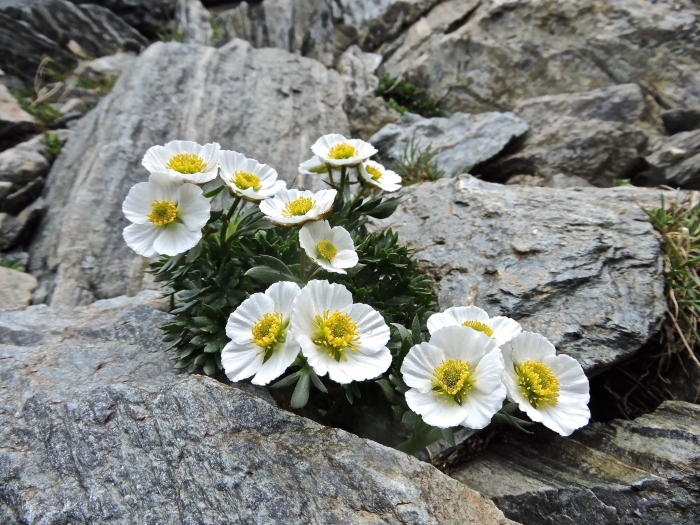Glacier Buttercup
(Ranunculus glacialis)
Glacier Buttercup (Ranunculus glacialis)
/
/

Karsten Rohweder
CC BY 4.0
Image By:
Karsten Rohweder
Recorded By:
Copyright:
CC BY 4.0
Copyright Notice:
Photo by: Karsten Rohweder | License Type: CC BY 4.0 | License URL: http://creativecommons.org/licenses/by/4.0/ | Rights Holder: Karsten Rohweder | Publisher: iNaturalist | Date Created: 2016-07-21T10:53:18Z |

























Estimated Native Range
Summary
Ranunculus glacialis, commonly known as the glacier buttercup or glacier crowfoot, is an Arctic-alpine perennial herb native to the cold, harsh environments of high mountain ranges and Arctic regions. This includes southern Europe, the Scandinavian peninsula, Iceland, the Faroe Islands, Jan Mayen, Svalbard, eastern Greenland, and Finland. It is typically found in fell-fields and snow-bed habitats, often near meltwater streams, and thrives at elevations over 13123 feet (4000 meters) in the Alps. Ranunculus glacialis is characterized by its fleshy, shiny leaves and a single large flower that changes color from white to pink or reddish as it matures. The flowering season occurs in the brief Arctic summer, and the flowers are moderately showy, attracting pollinators such as flies and bees that are active during the short growing season.
The glacier buttercup is valued for its unique adaptation to extreme environments and its ability to add beauty to rock gardens and alpine collections. It is not commonly cultivated due to its specialized habitat requirements but can be grown from seed in well-draining, gravelly soil with consistent moisture, mimicking its native meltwater stream conditions. It requires full sun to light shade and cool temperatures. In cultivation, it is important to avoid overly warm or dry conditions, which can be detrimental to the plant. Ranunculus glacialis is considered endangered in Finland due to habitat loss and climate change, highlighting the need for conservation efforts.CC BY-SA 4.0
The glacier buttercup is valued for its unique adaptation to extreme environments and its ability to add beauty to rock gardens and alpine collections. It is not commonly cultivated due to its specialized habitat requirements but can be grown from seed in well-draining, gravelly soil with consistent moisture, mimicking its native meltwater stream conditions. It requires full sun to light shade and cool temperatures. In cultivation, it is important to avoid overly warm or dry conditions, which can be detrimental to the plant. Ranunculus glacialis is considered endangered in Finland due to habitat loss and climate change, highlighting the need for conservation efforts.CC BY-SA 4.0
Plant Description
- Plant Type: Herb
- Height: 0.2-0.5 feet
- Width: 0.1-0.2 feet
- Growth Rate: Slow
- Flower Color: White
- Flowering Season: Summer
- Leaf Retention: Deciduous
Growth Requirements
- Sun: Full Sun
- Water: Medium
- Drainage: Fast
Common Uses
Low Maintenance, Rock Garden
Natural Habitat
Fell-fields and snow-bed habitats near meltwater streams in high mountain ranges and Arctic regions
Other Names
Common Names: Ice Buttercup, Issoleie, Glacier Crowfoot
Scientific Names: , Ranunculus glacialis, Beckwithia glacialis, Caltha kamchatica, Hecatonia glacialis, Oxygraphis gelidus, Oxygraphis glacialis, Oxygraphis glacialis, Oxygraphis vulgaris, Ranunculus crithmifolius
GBIF Accepted Name: